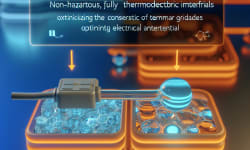Eco-Friendly, Fully Recyclable Ionic Thermoelectrics Revolutionize Human–Machine Interfaces
Thermoelectric materials have long held promise for converting temperature gradients into usable electrical energy, but conventional options often suffer from rigidity, toxicity, and poor optical properties, limiting their use in next-generation wearable and skin-interfaced devices. In a groundbreaking advancement, researchers have engineered a novel ionic hydrogel system that is not only non-hazardous and fully recyclable but also delivers exceptional mechanical flexibility and electrical performance.
Unlike traditional inorganic thermoelectrics, these new hydrogels are composed of environmentally benign materials, making them safe for direct contact with human skin and suitable for sustainable device manufacturing. The hydrogel's unique ionic composition enables efficient energy conversion while maintaining transparency and stretchability—key attributes for seamless integration into human–machine interfaces, such as wearable health monitors and smart prosthetics.
The research team optimized the hydrogel's ionic conductivity and thermoelectric properties through precise control of its molecular structure, resulting in a material that can be easily recycled at the end of its lifecycle. This innovation not only reduces electronic waste but also supports the development of greener, more sustainable electronic devices.
By addressing the limitations of traditional thermoelectric materials, this new class of ionic hydrogels paves the way for safer, more eco-friendly, and high-performance human–machine interfaces, marking a significant step forward in the field of sustainable electronics.
Read the source »






